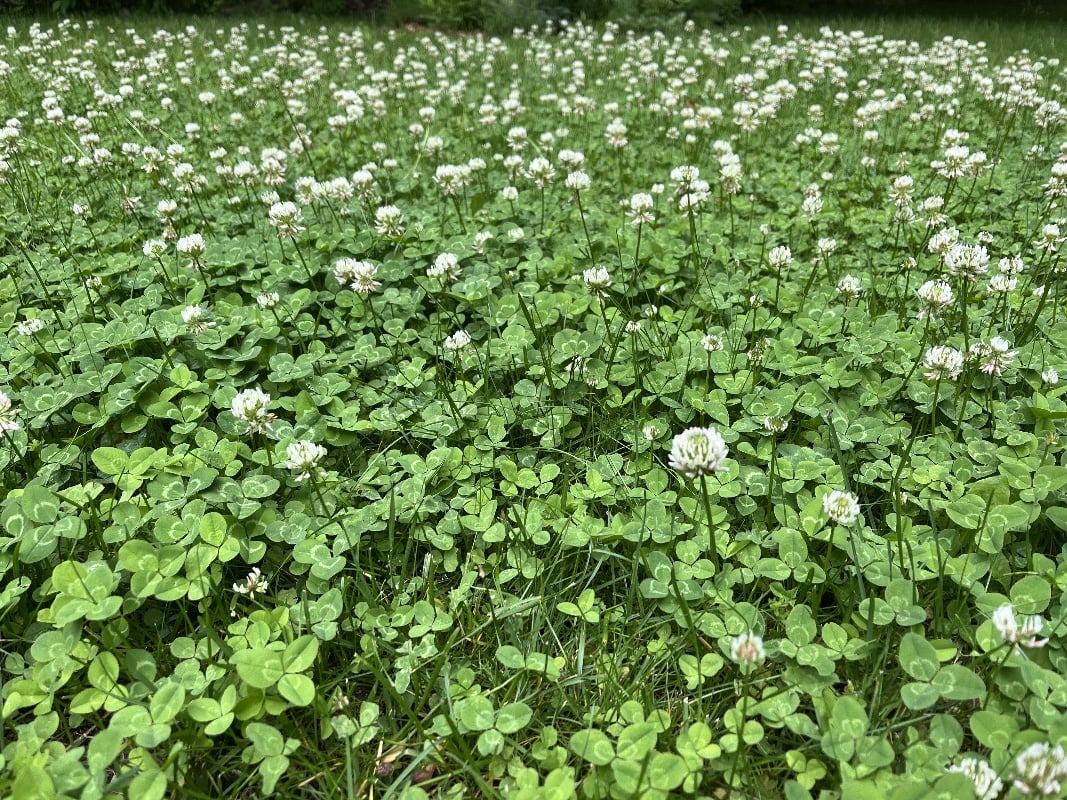
Clover Taking Over: How to Get Rid of White Clover in Your Lawn
As you probably already know, some weeds spread faster than others. While some weeds seem to just grow in patches here or there, others seem as though they spread across your entire lawn…almost overnight!
White clover weed is one that tends to spread like wildfire.
Clover is an aggressive grower which is frustrating since large patches of it can start to crowd out desired turfgrass. That can be a problem later on when you end up with bare patches in your lawn after the clover has died.
This is why it’s important to get clover under control quickly.
In this article, we’ll dive into everything you need to know about white clover, including how you can get rid of it.
What Does White Clover Look Like?
White clover is a low-growing weed that has small white flowers and leaves in a trefoil shape. It is commonly mistaken for oxalis, which is another common New England lawn weed. The leaves are quite similar but oxalis has yellow flowers. Both are nuisance weeds that can grow quickly.

White clover tends to prefer soil with a low pH, which is an environment that is not optimally suited for healthy grass growth. These areas tend to be thinned out already, making it easier for white clover weed to sneak in.
White clover has a shallow root system and will spread quickly. When people say “Clover is taking over,” they aren’t kidding.
Once this weed starts growing, it can be very aggressive in terms of spreading across the lawn.
How to Get Rid of White Clover in Your Lawn
There are a couple of important things that you can do to get rid of white clover.
For one, you want to make sure that you are mowing on the higher side. Homeowners tend to cut their lawns short, which puts a tremendous amount of stress on the grass. It also creates an environment where clover is more likely to grow.
When you keep the lawn on the higher side, it makes it more challenging for white clover to spread as it will be choked out by your thick turf.
You also want to make sure that you water properly. Clover performs best in lawns that are either too wet or too dry. Most lawns need around two inches of water per week to stay healthy.

Of course, we understand you want to know how to kill white clover, particularly if you already have it growing on your lawn. The good news about this weed is that even though it’s fast-growing, it can be relatively easily controlled with a selective broadleaf weed control product.
If you have a severe case, you may require repeated controls.
As with any weed, your or your lawn care professional must keep up with treatments throughout the season. Weeds are sadly not a “once-and-done” thing. They’re going to keep trying to come back. You’ll need to take an aggressive approach to weed control in order to get the upper hand.
To get the best results, it’s also important that you’re working with the best lawn care provider. Weed control products are not all created equally as some people assume. There may be more than a dozen choices when it comes to professional products, and you want to make sure you’re working with a company that’s choosing what’s best.
While we’d love to say that every lawn care company is going to take the best approach to weed control, this simply isn’t the case. Some companies will try to maximize their profit by using cheap products. They also won’t make an effort to get to the root of the problem (which we’ll talk about next).
How to Prevent White Clover Weed
Of course, any good weed control program goes beyond the instant gratification of killing a particular lawn weed and looks at the problem deeper. As we’ve mentioned in previous articles, healthy soil is at the heart of what’s growing in your lawn.
While you can definitely get rid of white clover with broadleaf control, you also want to keep it from coming back. That means getting to the root of why you had this weed in the first place.

White clover prefers to grow in soil with a low pH. A soil test can be beneficial to determine if your pH is unhealthy for grass growth. Ultimately, you want to be able to fix bad lawn soil so that you can have healthy grass growth.
A Comprehensive Approach to Weed Control in New England
Keep in mind that white clover is just one of many weeds that can be growing in your lawn. Other common culprits include crabgrass, chickweed, oxalis, and dandelions, to name just some. This is why it’s important to work with a lawn care company that looks at the big picture and takes a comprehensive approach to weed control.
There is no one-size-fits-all answer here.
.jpg?width=1200&height=900&name=weeds%202%20(1).jpg)
Different weeds often require different products and solutions. And the time of year can have an impact on what is growing and how to deal with it. You want to choose a lawn care provider who will switch up what they’re using and not just take a blanket approach.
It’s also worth mentioning that your efforts to grow a thick and healthy lawn will also help keep white clover weed and other invaders at bay. These weeds tend to spread in thinned-out areas where grass is already struggling. But if you grow a thick and healthy lawn, it will be harder for weeds to creep in.
This is why keeping up with routine professional lawn care is important. You want to fill in bare spots and grow thick grass that will crowd weeds out.
Choosing Lawn Care in Southern New Hampshire, Northeastern Massachusetts, & Southern Maine
When you partner with a lawn care professional, you can let go of your weedy worries and know that they’re being handled by a pro.
At Seacoast Turf Care, we take New England weeds like white clover seriously. We provide lawn care services in Southern NH, Southern Maine, and Northeastern Massachusetts that help to promote healthy lawns without weeds.
We know lawn weeds are often one of the biggest sources of frustration for homeowners. We take a science-based approach to all of our lawn care services. That includes promoting a thick and healthy lawn that is going to start to naturally choke out weeds on its own.
Soon, you’ll be able to enjoy more time on your lawn without stressing over weeds.
Ready to be where the grass is greener, healthier, and free from weeds? Get lawn care pricing for your Southern New Hampshire, Maine, or Massachusetts lawn.
Image Source: white clover



